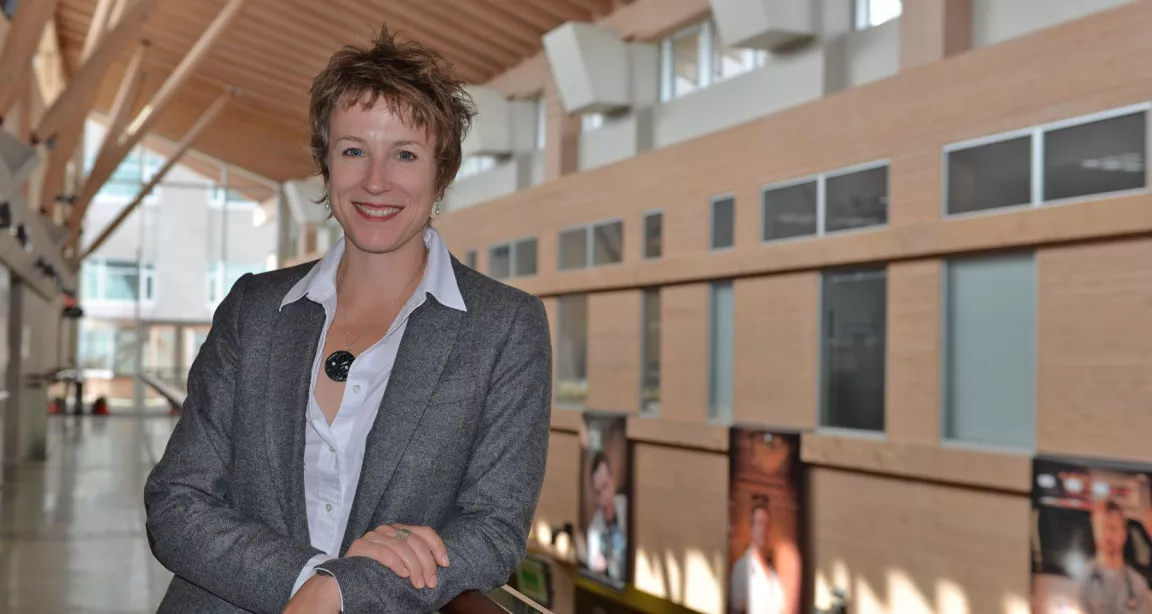UNBC researcher receives funding to pursue unique First Nations project at Northern Health

Prince George, BC – A UNBC researcher will lead the development of a unique research project centred on First Nations employment within Northern Health thanks to support from a federal pilot grant. Dr. Sarah de Leeuw has received $149,500 from the Social Sciences and Humanities Research Council (SSHRC) and the Canadian Institutes of Health Research (CIHR) as part of a new Healthy and Productive Work - Partnership Development Grant.
Initial work on the pilot project will focus on building stakeholder partnerships and knowledge sharing with an emphasis on enhancing cultural safety in northern health-care work environments. Key partners include Northern Health, the First Nations Health Authority (FHNA), UNBC, and the Northern Medical Program, as well as numerous Indigenous and non-Indigenous stakeholders across the North.
“We are interested in studying the workplace in relation to Indigenous employees at Northern Health, and how to bring more Indigenous workers into the organization,” explains de Leeuw, a Northern Medical Program and Geography associate professor. “We will look at how to best gather information in this area, including innovative approaches such as videos of individuals highlighting what an ideal healthy work climate could look like for Indigenous people.
“We will explore many different questions relating to all areas of the North. For example, how can we attract more Indigenous pharmacists to the Northwest, keep more Indigenous doctors in Prince George, or bring more Indigenous nurses into northern emergency departments?”
The SSHRC and CIHR’s Healthy and Productive Work joint initiative aims to bring together a wide range of researchers and stakeholders across sectors to help develop and put solutions in place that improve the health and productivity of Canada’s diverse workforce. The initiative’s partnership development stage (Phase 1) is in effect until 2018. Successful development grant applicants will be eligible to apply during Phase 2 which will provide funding for the implementation of a full, multiple-year study.
“As part of this first step, we are going to focus on building and strengthening northern partnerships, and also examine what is needed to create leading practices for a health authority relating to its Indigenous workforce and to putting Indigenous ways of knowing into place,” adds de Leeuw.
The project is being further supported through in-kind contributions, valued at approximately $145,000, from various organizations including the project’s major partners, Northern Health and FHNA.
“Northern Health is committed to building an open and collaborative relationship with First Nations and Aboriginal people and communities,” said Margo Greenwood, VP Aboriginal Health at Northern Health. “Building strategies to develop a representative workforce would support a culturally safe health system, and this research project will assist us in our efforts to develop and evaluate our recruitment and retention strategies”
“Ensuring the health and safety of First Nations employees and a positive work environment for healthcare partners, in part helps set the tone for effective, accessible and culturally-safe healthcare for First Nations communities,” said Richard Jock, Chief Operating Officer of the First Nations Health Authority. “Today’s announcement represents an excellent opportunity to work with our partners to develop more culturally and contextually safe environments to support and increase the number of First Nations healthcare professionals working within the healthcare system. It is also a great demonstration of the leadership commitment to implementing and supporting the Truth and Reconciliation Commission Calls to Action, by examining current health authority infrastructures to increase cultural safety and increasing the number of Aboriginal health professionals.”
Other project in-kind contributors include the Michael Smith Foundation for Health Research, the National Collaborating Centre for Aboriginal Health, the Health Arts Research Centre, Arts Health Network Canada, Two Rivers Gallery, and Carrier Sekani Family Services.
In addition, through the support of the Health Arts Research Centre led by de Leeuw, three Northern Medical Program students will join the project to assist with First Nations stakeholder engagement.
“Working together with First Nations and Aboriginal stakeholders to help build a strong foundation for cultural safety in our region, and across the country, is an extremely important priority,” said Dr. Geoff Payne, UNBC Interim Vice President, Research and Graduate Programs. “The development of this project will help to further enhance our engagement with our health research collaborators across the North, as well as strengthen ongoing research partnership between Northern Health and UNBC.”
This project is supported by the Research Support Fund, a tri-agency initiative of the SSHRC, CIHR and the Natural Sciences and Engineering Research Council (NSERC), which assists Canadian post-secondary institutions and their affiliated research hospitals and institutes with the expenses associated with managing the research funded by these three federal research granting agencies.